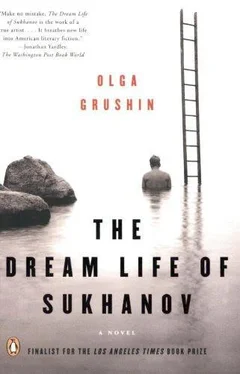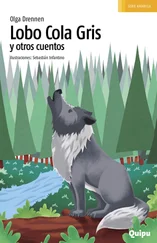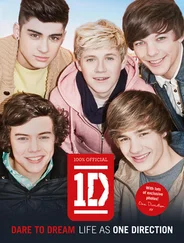Without a word, he strode into the corridor, closed his fingers on the handle of a hallway closet, and paused, ignoring the burst of his mother’s alarmed cries at his back, preparing instead for what he knew he would find just behind this door—windows into his past, windows into his soul, whole stacks of them, piled negligently this way and that, just as he had left them two decades ago, some facing away, some slightly graying, perhaps, with deposits of dust and old-woman smells, maybe even a wary touch of mildew, others certain to throw themselves at him with their wild colors and violent shapes like so many untamed beasts long in confinement. He suddenly found it uncanny that this closet had always been here—that his paintings had always been here—that there had always been only this thin partition between his present and that other world, once wholly his, now full of unfamiliar, wonderful, terrifying marvels—and that he had known it all along, yet spent years learning how to forget so he would not have to hear the muted, sorrowful call of the ghosts on those rare occasions when he sat in his mother’s living room, drinking lukewarm tea, eating repulsive pastries, talking impressively about a new edition of his book, his son’s excellent grades, Nina’s autumn trip to Paris….
Now, in a single moment, as he stood feeling in his palm the weighty coolness of the door handle, he remembered it all—all, at least, that was left to remember of a life that, with the appearance of a February 1963 issue of Art of the World, had started on its way to safety, constancy, tranquillity. That first article had been followed by a rapid succession of short pieces, culminating in early 1964 with a lengthy monograph, Contemporary Applications of the Socialist Realism Method to Landscape and Still Life, whose loudly hailed publication, as well as his timely membership in the Party, had helped him obtain later in the year, just as Nina had become pregnant, a two-room Arbat apartment for his mother. After Nadezhda Sergeevna moved out, he converted the spare room into a studio—for, of course, he had never fully intended to give up painting—but at first a steady stream of lectures and magazine assignments left him unable to work, whether from exhaustion or from some deeper, darker emotion that he did not want to define, and then Vasily was born, and Nina needed space for drying his sheets and ironing his clothes, and Pyotr Alekseevich made them a gift of a crib that was charming but unwieldy, and little by little, he found his canvases and oils relegated further and further into unobtrusive shadows, until the only painting remaining in full view was a portrait of a discreetly expectant, dreamily happy Nina, presented to them by Malinin and soon placed prominently over Sukhanov’s recently acquired, gor geously carved desk.
After that, something began to happen to the fabric of time: it grew thinner and silkier and passed through his hands so lightly that he barely noticed the patterns and colors in its smooth, flowing skin. Another year passed, Nina was pregnant again, they were awaiting a move to a significantly larger apartment, Ksenya was born, Nina left her job, those in the know whispered of his impending nomination to an important position as the head of the art criticism department at a certain well-respected institute, and a number of friendly colleagues, led by the director Penkin himself, started to drop by now and then with bottles of cognac, ostensibly to gossip and to coo over his children. He decided that it would be wiser to move his underground art out of the way for the time being, at least until the promised position materialized, and one evening crammed all his paintings into his new Zhiguli, drove over to his mother’s (she had more room than she needed, anyway), and calming her fears with assurances that it was only temporary, rapidly, as if their touch burned his fingers, piled the canvases, with their manifold scents of fairy tales and nightmares, into a hallway closet. After closing the door, he stood still for a long minute, perhaps willing himself to memorize the weighty coolness of the door handle in his palm as a promise to return someday soon; then turned, and walked away. But as he walked away, he already knew in some concealed, murky layer of his soul that he would never be back to claim his dark treasure—and knowing this, tried not to listen to the chorus of disembodied voices whispering, pleading at his back, tried to ignore the strange, chilling certainty that for him the flow of time had suddenly ceased, that at this very instant his life was over, irrevocably, forever—
And of course, the feeling was ridiculous, and of course, time did not stop, and his life continued, and over the years there were plenty of changes, all for the better—the new apartment, the new position, the children growing up, the acclaimed books, the purchase of the dacha, the eventual staggering promotion to the helm of Art of the World, speedily rewarded by another, still more splendid apartment in the Zamoskvorechie and a personal chauffeur—yet now, as he stood so close to his past, his fingers curled around the door handle, his knuckles white, he felt that the previous two decades of his life had meant nothing, had been nothing, had vanished into the emptiness whence they had been born—and that only today, after all this waste, he finally had the power to make time flow once again.
He threw the door open.
A strong smell of mothballs escaped into the corridor. Two old coats hung on metal hangers in one corner, and in another, a monstrous vacuum cleaner, its dust bag deflated, leaned against the wall. There was a shelf he did not remember; a woolen mitten dangled off it into space. He looked at the mitten for a while, as if trying to fathom its purpose, then slowly closed the door, and returned to the kitchen. His mother had stopped talking, and was staring at him with unblinking eyes.
“How about some tea?” a funny-looking bearded man offered brightly. “I’ll get another cup, don’t stand up, Aunt Nadya.”
Sukhanov knew the man well; he was a relative of some sort, a childhood playmate perhaps; it seemed that they had recently quarreled. It did not matter any longer.
“Mother,” he said, his voice quiet and oddly strained. “Mother, where are they?”
A cup rang out against a saucer as the relative clumsily dropped them onto the table.
“Mama, please, this is important,” he said, brushing away a brief sensation of repeating his own, seemingly recent words. “Where are my paintings?”
Her mouth was working convulsively
“Well, they are not here, are they?” she said with shrillness.
“Did you move them somewhere? Why didn’t you tell me? I thought—”
“I know what you thought! You thought, how convenient, turning your mother’s place into a storage dump! Did it ever occur to you that I might not like it, that I have needs too, that I’m not just someone to order around?”
“Mama, what are you talking about? No one ordered you around. I just—”
“No, it never occurred to him!” She was shouting now. “And just look at him, barging in here after all this time, going through my closets without permission, expecting everything to be just the way he left it twenty years ago, as if I don’t live here, as if I’m nothing to be concerned with, as if I don’t have the right to do what I please in my own home—”
Perhaps she saw something strange in his face, or else she ran out of breath; all at once she fell silent. The relative, a fixed smile on his lips, finished cutting the cake into uneven slices, set the knife down, picked up his hat, and cautiously crept out into the corridor and tiptoed away; somewhere in the apartment a door opened and closed. Sukhanov stood without moving. The sun had already vanished over the rooftops, but the air was still luminous, and in its warm crimson glow the small kitchen, with its table ready for tea, its old porcelain clock on the wall, the richness of the creamy bird‘s-milk dessert crumbling on the plates, the leaves rustling against the windows, seemed wonderfully cozy and intimate and at the same time eternal, like some masterly painting of family togetherness, some vision of an ideal life….
Читать дальше








![Theresa Cheung - The Dream Dictionary from A to Z [Revised edition] - The Ultimate A–Z to Interpret the Secrets of Your Dreams](/books/692092/theresa-cheung-the-dream-dictionary-from-a-to-z-r-thumb.webp)



